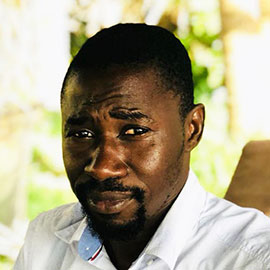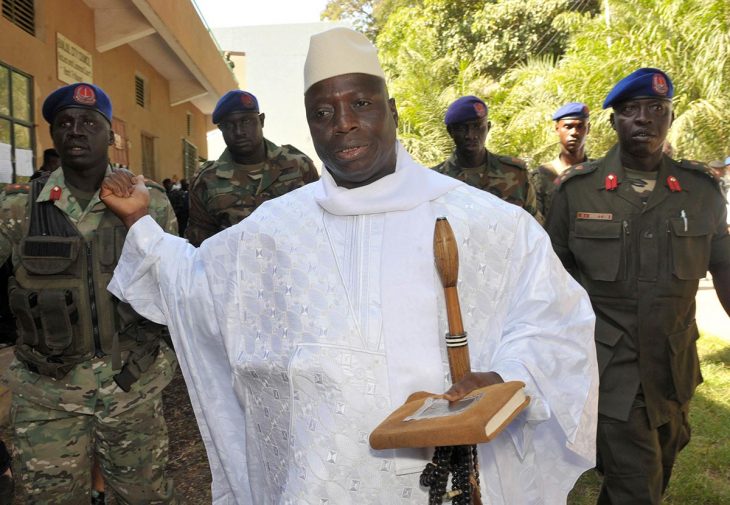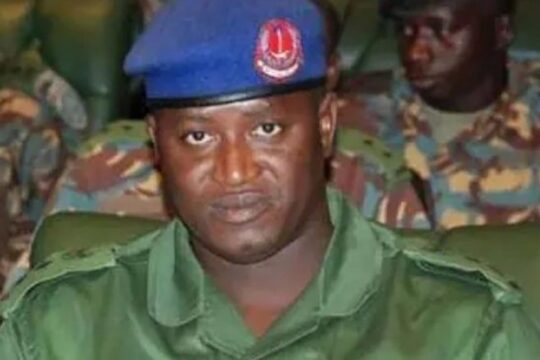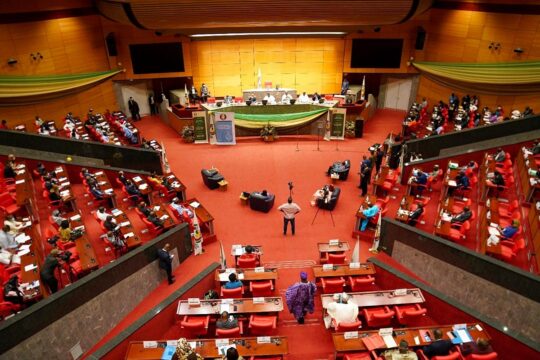In Yahya Jammeh’s Gambia, the National Intelligence Agency (NIA) was long a source of fear. Gambia’s former president ruled the small West African country for 22 years, with the help of two institutions: the NIA and the Junglers, a paramilitary hit-squad.
In 2006, they were not far away when two prominent figures disappeared: journalist Chief Ebrima Manneh and youth politician Kanyiba Kanyi. Kanyiba, a supporter of the United Democratic Party (UDP) who lived in Bonto, a settlement about an hour’s drive from Banjul, disappeared on September 19, three days before the 2006 presidential elections. He was a youth leader of the UDP, a party that was Jammeh’s major contender.
At this time, Kanyiba’s widow Isatou Kanyi was three-months pregnant. Her husband was taken away by men who arrived at their house in a taxi without a number plate, she recounted. “Jammeh would do anything to keep himself in power including killing people,” said Isatou as she appeared before the Truth Commission, on October 28.
“Arresting Kanyiba was an attempt to intimidate others in the party,” she added. Under Jammeh, such practice was common among NIA agents and Junglers, according to previous evidence brought before the Commission. Isatou, in the early days of her husband’s arrest, thought it was an election intimidation tactic. Reality hit when months passed, and then years, without him coming home or appearing in any court despite efforts by UDP leader and lawyer Ousainou Darboe to take Kanyiba’s case to court.
“I later saw ex-president Yahya Jammeh on television peddling information that my husband may have used the irregular route to Europe using the Sahara Desert. It was a lie. He was trying to exonerate himself of my husband’s disappearance,” said Isatou. The state authorities did not acknowledge arresting Kanyiba and subsequent denied that he was in their custody, but Isatou is convinced that her husband’s last location was the custody of NIA.
Systematic torture
In the past two weeks, six civilians have so far testified before the Truth, Reconciliation and Reparations Commission (TRRC) to various forms of right violations by NIA including torture, disappearances, illegal arrest and detention.
Ebrima Barrow currently lives in the US from where he testified through a video link before the Truth Commission. In early 2000, Barrow was arrested with three other civilians and accused of organizing a coup. He spent seven months in NIA custody without being allowed to see a family member.
Barrow said during his stay at the NIA, he was tortured and burnt on his buttocks with cigarette butts: “My body and legs were swollen… I was in pain.” Barrow said they wanted him to implicate Lalo Jaiteh, an aide de camp to former president Jammeh, and one lieutenant Omar Darboe, as leaders of the alleged coup plot. “They didn’t give me food in the morning or in the afternoon. They only gave me food in the evening, and it was very little,” he said.
Barrow said he had made 65 court appearances. Though the NIA could not prove their case, they illegally held him and his colleagues for over four years. He would later be transferred to Mile 2. Eventually, he was freed by the courts and he fled the country for the US in 2004.
Arbitrary arrests
Malanding Mballow was a school principal at Ndow’s Comprehensive, a secondary school in Gambia. In 1995, he was arrested by the NIA and accused of insulting ex-president Jammeh, beaten thoroughly and put in illegal detention for five days without a court appearance. When releasing him, the state operatives took his blood-stained clothes from him, he recounted to the TRRC. Mballow named four military among his torturers: Alpha Bah, Malafi Corr, general Alagie Martin and Daba Marenah. Marenah, Bah and Corr were later killed by Jammeh’s junglers for reportedly attempting to overthrow him in 2006.
Also recounting his torture experience was Alieu Lowe, a cousin of late colonel Ndure Cham, the reported leader of the 2006 coup plot. Lowe was detained at NIA for three days incommunicado and later moved to Mile 2, where he was illegally held for five years. The state later secured his conviction and he was sentenced to 20 years for helping colonel Cham to escape. However, he was freed through a presidential pardon in 2015.
Illegal land grabbing
Aside from torture, illegal arrests and disappearances, NIA also stand accused of illegal land grabbing. There is a dubious “syndicate” run by the NIA and other security agencies to illegally grab land from innocent civilians, 61-year-old Musa Cham told the Truth Commission on October 27. “The syndicate operated through one Yankuba Cham who works at the Department of Physical Planning. If a particular land was sold, he would pre-date the documents of the new buyer to make it appear that the land was fraudulently acquired,” said Cham.
“They forged stamps of alkalolu (village heads) and Physical Planning approval, which they used to transfer lands to persons they received money from. So that, if you should go to court, the one with the predated fake documents with fake authentication from Physical Planning would win against you, the legitimate owner.” He further alleged that several land agents in his native city, Sukuta, were also engaged in the criminal syndicate.
Cham had an encounter with the NIA when he wanted to sell his plot to one Tala Mboob for a little over D800,000 [$15,458]. But he was told the land is situated in former president Jammeh’s reserve lands and as such, he could not sell it for more than D200,000 [$3,864] or risked losing it. Cham would later be arrested and detained at the NIA for twenty-one days, during which he claimed to be beaten. Cham said he received a part payment of D130,000 from the price out of which another D70,000 [$1,352] was grabbed by the NIA “for the expenses of his detention”.
The hearing into the NIA activities will continue when the Truth Commission resumes, after a break this week. Several alleged perpetrators are expected to appear, including the current director general of the NIA, Ousman Sowe, who also served under Jammeh.






